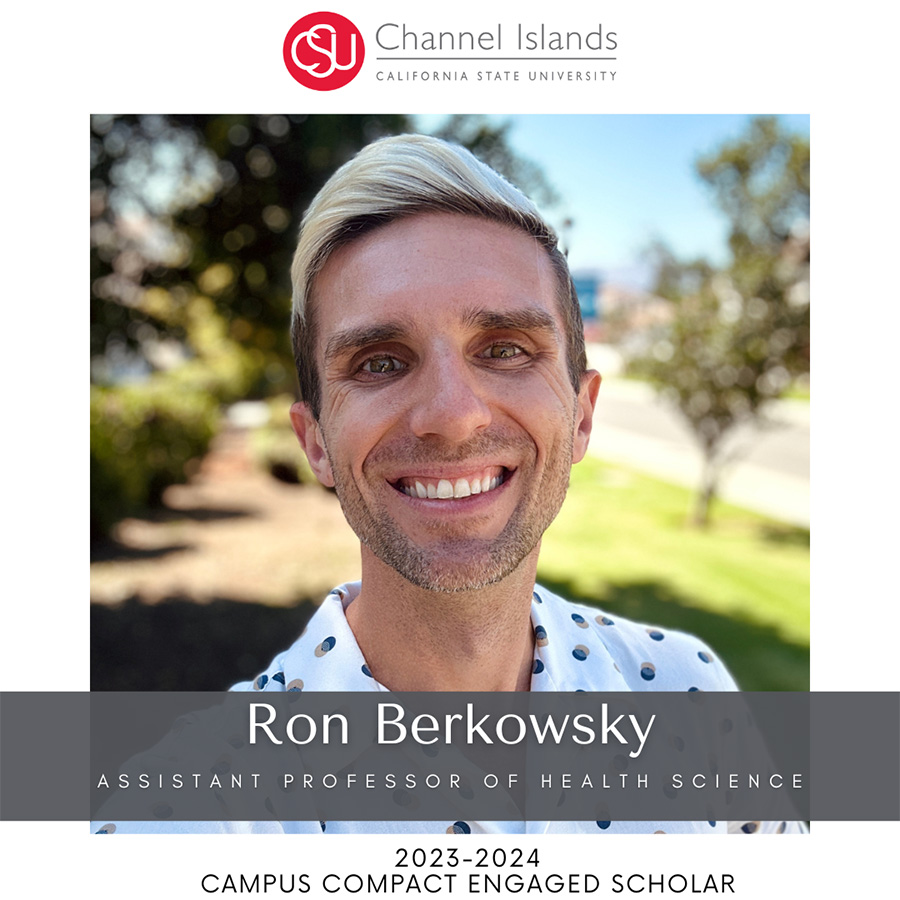 Sept. 5, 2023 - Ventura County’s senior population (age 65+) is expected to increase 14% this year to 224,812, outpacing the overall growth of the county population, which is projected to increase just 2% to 884,148 in 2023.
Sept. 5, 2023 - Ventura County’s senior population (age 65+) is expected to increase 14% this year to 224,812, outpacing the overall growth of the county population, which is projected to increase just 2% to 884,148 in 2023.
CSU Channel Islands (CSUCI) Assistant Professor of Health Science Ron Berkowsky is researching ways to address the increased need for caregiving this will require, as well as the unique needs of the county’s older Americans, including the aging LGBTQ+ population.
He plans to support his research as one of 14 faculty members nationwide accepted into the prestigious Campus Compact’s Engaged Scholar Initiative. The Engaged Scholars Initiative is a prestigious year-long program in which a diverse group of early-career faculty and staff participate in professional development, attend retreats, and receive individual support through mentoring and coaching on work conducted in the community. Each scholar is expected to work on a specific project during their year-long program.
At the center of each Engaged Scholar’s project is the concept of equity and the need to adjust research and service projects to address imbalances in the community, recognizing that “we all do not start at the same place.” To account for this, each project will also have an element of community involvement.
“We are all very mindful of diversity, equity and inclusion (DEI) with our projects,” Berkowsky said. “As a group, we will be discussing not only the status of our different projects, but also having a robust conversation about community-engaged work and what does that look like.”
Berkowsky plans to use the fellowship to develop a research project on either the needs of the aging LBGT+ community or an emerging model of organized volunteer caregiving for older Americans. In his letter of recommendation to the Engaged Scholar Program, CSUCI President Richard Yao stressed how well Berkowsky’s research addresses the needs of Ventura County’s expanding aging population.
“With the anticipated impacts of this expansion on healthcare, both in Ventura County and nationwide, policymakers have engaged in robust discussion on how to best meet the caregiving needs of this group,” Yao wrote. “While much of this discussion has focused on expanding and strengthening both paid caregiving services, less attention has been devoted to strengthening volunteer caregiving services provided by community volunteers through local nonprofit organizations.”
If he selects the volunteer caregiving project, Berkowsky plans to evaluate the state of volunteer caregiving throughout the nation. He plans to work with the director of a Ventura County-based volunteer caregiving nonprofit to see how feasible it would be to coordinate and streamline a network of volunteer caregiving organizations across the nation to address the caregiving crisis.
“When we think about caregiving, we think of paid caregiving services or unpaid family caregiving. There are strengths and weaknesses to both approaches,” Berkowsky said. “We have people who can’t afford paid caregivers and for family members, it can be quite a burden.” Berkowsky’s work would focus on a different model: of addressing older adult needs through community volunteers.
His other area of research interest is the aging LGBTQ+ community. Berkowsky sits on the board of the Ventura County Area Agency on Aging (VCAAA), which reports a growing number of requests for information and services.
“I have a keen interest in LGBTQ+ aging because I do identify as bisexual,” Berkowsky said. “In addition, I have an educational and research background in older adults.”
Berkowsky wants to research what barriers older LGBTQ+ Americans have to care and what unique issues confront them.
“There really is a significant need for data on older LGBTQ+ adults and their experiences,” Berkowsky said. “When we typically think of LGBTQ+ issues, we think of various issues such as coming out, increased risk of drug abuse, or accessing transgender care. Older adults experience these but also experience unique issues. They may have been ‘out of the closet’ and open about their identity their entire lives, for example, but if they go into assisted care or skilled nursing they may not know if it’s a safe space for them. They may actually ‘go back into the closet.’”
Another problem is a social network that doesn’t include family members who couldn’t accept them or their partner or both.
“LGBTQ+ individuals generally have an extensive friend network, but they are usually mostly of a similar age. With older adults, this means isolation may be a problem as their friend networks also age and pass away,” Berkowsky said.
Berkowsky said he will decide on his area of study for the Engaged Scholar project in the next month or so.
Berkowsky was nominated for the 2023/24 Engaged Scholar cohort by CSUCI Center for Community Engagement and the Health Science Program.
Read more about the Engaged Scholars Initiative on the Campus Compact website at https://compact.org/current-programs/engaged-scholars-initiative.
